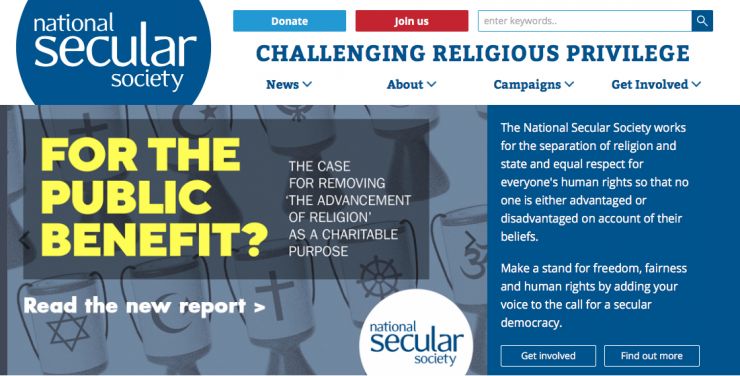National Secular Society says religion has no public benefit

This week the National Secular Society called on the government to change the law so that Christian organisations which exist “solely or primarily for the purpose of promoting religion” should not be allowed to benefit by registering as a charity.
In their report they argue that “the advancement of religion” is not inherently a public benefit and can sometimes even cause harm to society and so should no longer be considered as a legitimate charitable object. The report gives examples of charities, mainly Christian ones, to which this would apply. Affinity itself is cited in the report as a charity that apparently “does more harm than good”.
The report provides no clear definition of what harm is caused by advancing the cause of a religion, by “proselytising” or by presenting the teaching of a particular religion on moral issues.
Further, it conflates the illegal actions of some members of particular religious charities (e.g. financial misconduct or sexual abuse) with the organisation itself. The implication is that the criminal behaviour was somehow a consequence of their faith but in the cases they use, no evidence is provided to demonstrate that crimes were connected with the teaching of their religion.
However, the central question is still a fair one: Is the promotion of religion, especially Christianity, of public benefit?
We argue that Christian charities benefit the public in at least these two ways:
Firstly, Christians, churches and Christian organisations bring generally recognised benefits to the wider public. For example, they provide the majority of youth groups and young people’s services across the country, promote community cohesion, relieve hardship and loneliness, give practical advice, run community groups and support local authorities in protecting and supporting the most vulnerable. This is motivated by the teachings of Christ who said that his people should be a loving, serving community.
But secondly, we contend that the advancement of religion is intrinsically beneficial. It is surely important that we all learn about the history and practices of every section of our culture to aid social cohesion and understanding. And, given the religious heritage of our country and present-day religious pluralism, this is especially relevant.
Most people would agree that there is more to life than simply our material wellbeing. Therefore, to present the teachings of Christianity on the purpose of life and to set out the basis for a common morality (shared convictions about right and wrong, truth and error) fulfils a need felt by many people today and is vital if we are to promote harmony and reconciliation in our communities.
Attempts to remove religion from the public square – to privatise religious convictions – far from being of public benefit has, in our view, been to the detriment of society.
We do not presume Christianity to be the only or even the dominant religion of this country but would argue that we can and do make a significant contribution, practically and morally, and it is legitimate to recognise this with charitable status.
Graham Nicholls is Director of Affinity
Listen below to Graham discussing this issue with James Whale on TalkRADIO on Wednesday evening:
And on TWR on Saturday:
Related articles
Stay connected with our monthly update
Sign up to receive the latest news from Affinity and our members, delivered straight to your inbox once a month.



